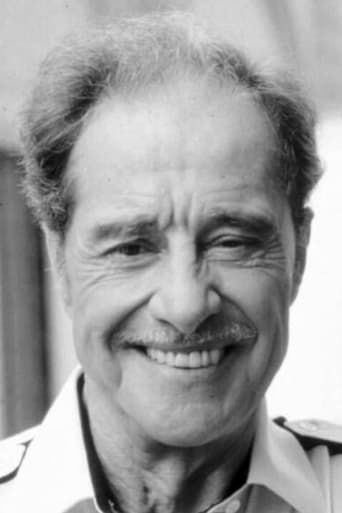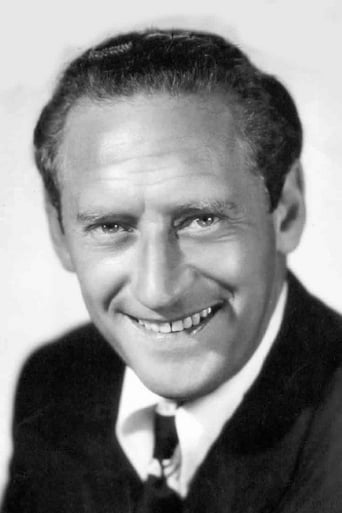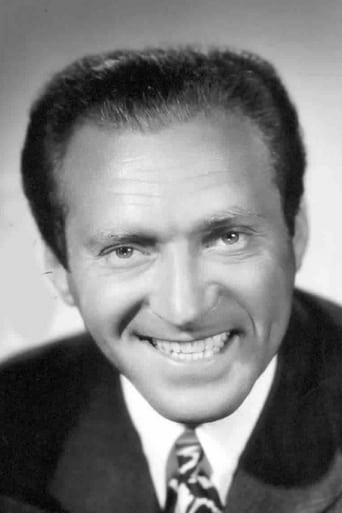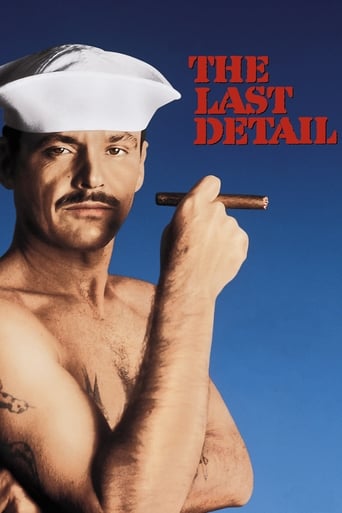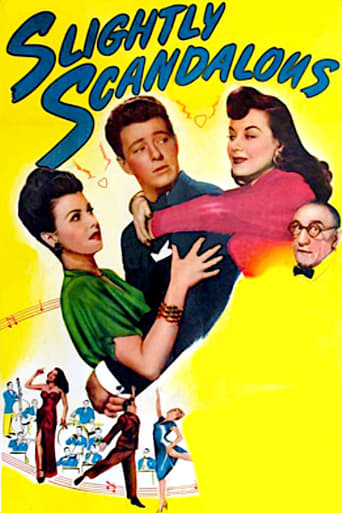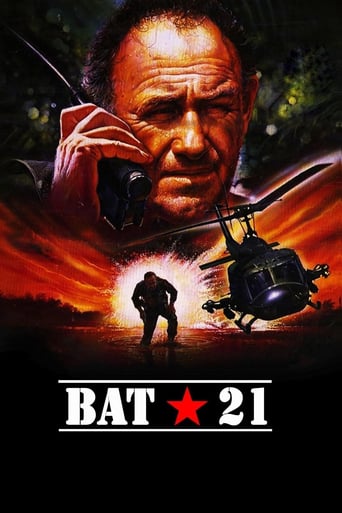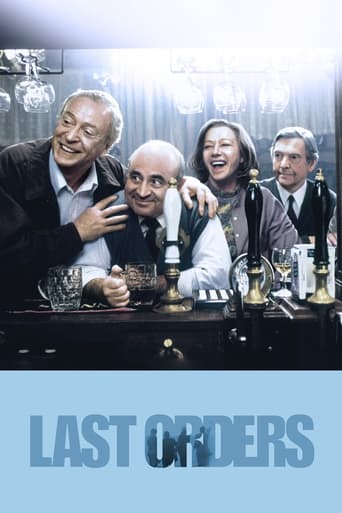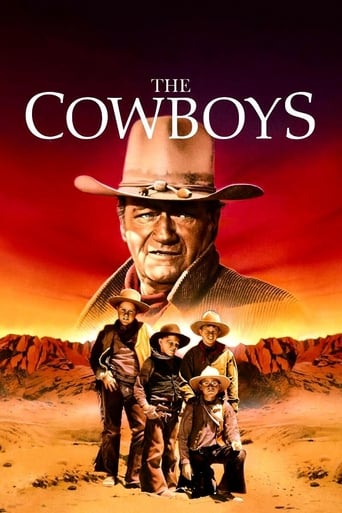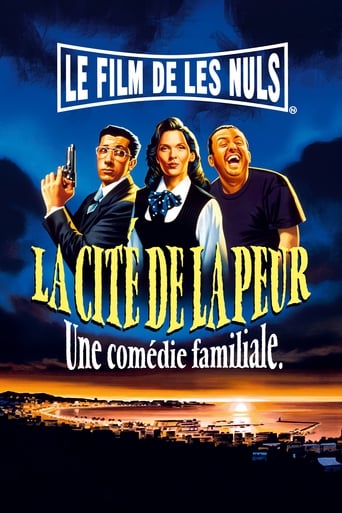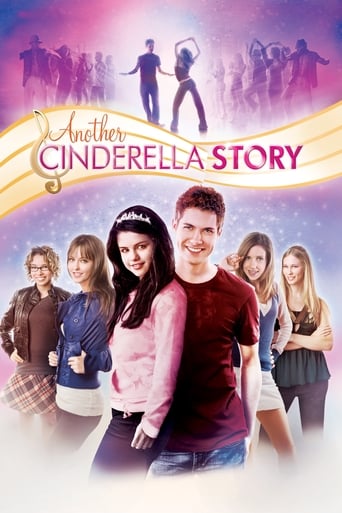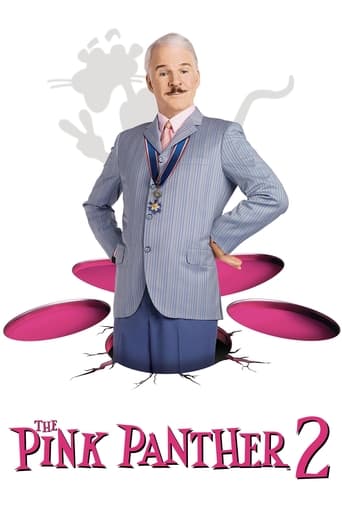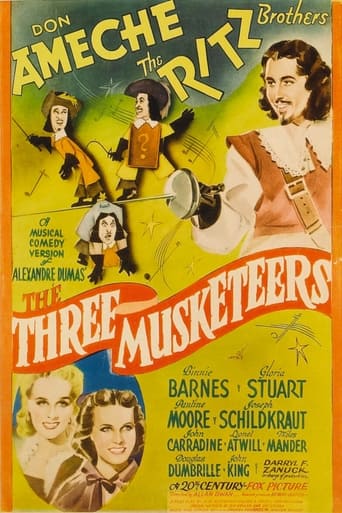
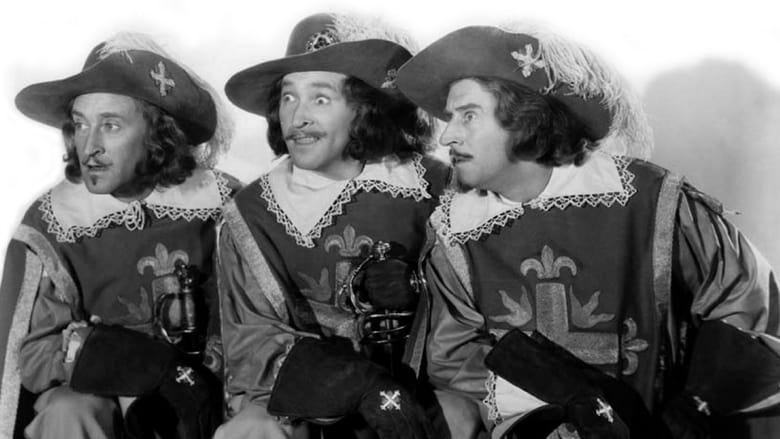
The Three Musketeers (1939)
A parodic remake of the story of the young Gascon D'Artagnan, who arrives in Paris, his heart set on joining the king's Musketeers. He is taken under the wings of three of the most respected and feared Musketeers, Porthos, Aramis, and Athos. Together they fight to save France and the honor of a lady from the machinations of the powerful Cardinal Richelieu.
Watch Trailer
Cast


Similar titles
Reviews
It's funny, it's tense, it features two great performances from two actors and the director expertly creates a web of odd tension where you actually don't know what is happening for the majority of the run time.
This is a coming of age storyline that you've seen in one form or another for decades. It takes a truly unique voice to make yet another one worth watching.
The film never slows down or bores, plunging from one harrowing sequence to the next.
Although I seem to have had higher expectations than I thought, the movie is super entertaining.
The only way to make a bad movie out of The Three Musketeers is to cast Charlie Sheen in it as they did in 1993. Note to other reviewers: EVERY filmed version of this Dumas' tale has to be a chop job—unless it becomes a multi-episode cable TV series. Note #2: most classics get spoofed (think how delightfully well Mel Brooks has done with Life of Brian, Frankenstein, Dracula, Robin Hood. Few actors of his day could surpass Don Ameche for versatility (singer, physical actor, comedy actor), and Binnie Barnes rivals any other female actor who's played Lady d'Winter, and she proved a fine foil for the Ritz Brothers. Add John Carradine and Lionel Atwill for villainy and we have a fine cast of pros. As to the Ritz Brothers, they were superb talents: precision dancers, singers and comedians who were among the highest paid revue and nightclub acts in the USA. Like many variety comedians (Beatrice Lillie, Bert Lahr, The Wiere Brothers, Shaw & Lee, Jimmy Savo), it was difficult to adapt narrative material for three surreal madcaps like the Ritzes. The Three Musketeers is enjoyable not only because of Ameche, Barnes, Carradine and Atwill, but for the bright and witty story curve fielded by Al, Harry & Jimmy Ritz. The Three Musketeers does not showcase the Ritzes at their best (see: You Can't Have Everything; Sing, Baby, Sing; and On the Avenue. Pass on The Gorilla; it doesn't merit anyone's consideration. But The Three Musketeers may be their best film in overall quality—after all, it was directed by Allan Dwan (who helmed the Doug Fairbanks version). Frank Cullen founder: ABQ Film Club and American Vaudeville Museum author: Vaudeville Old & New (Routledge 2007).
Silent film veteran Alan Dwan had helmed several of Douglas Fairbanks' best movies, and here turned out another swashbuckler, but with a difference: those zany Ritzes are on hand as a decidedly non-traditional trio of musketeers. Unlike the Marx Bros., whose movies were A-picture events, the now mostly forgotten Ritz Bros.' antics played in second features that failed to properly showcase their unique brand of knockabout comedy. Here they finally got a chance to perform in a good picture with a strong story and a good lead actor (Don Ameche as D'Artagnan) anchoring the proceedings, rather than just running about and being silly to no obvious purpose. The anarchic Ritzes here unleash their trademark catastrophic comedy to frustrate the machinations of Cardinal Richelieu and Lady deWinter. The Ritzes, of course, are not actual cavaliers, but rather a trio of dolts forced to masquerade as such to protect the Queen's honor. Much hectic action abounds, plus a few comedy songs, great silly costumes and a few of the Ritzes stage numbers such as a beautifully choreographed dance with cymbals on their bodies that must have taken years to perfect. The complex story is efficiently handled - the fat original novel plays out in a mere 72 minutes - and the straight action, heroically played by Ameche, and elaborately staged silliness of the Ritzes mixes well. An action comedy- musical would seem a difficult thing to blend correctly, but everything here is deftly handled and the cheapish production elements (leftover sets and contract players in supporting roles) do not hinder the overall effect. Worth going out of one's way to catch.
Unlike what I wrote regarding THE COUNT OF MONTE CRISTO (1934), the opposite is true about Dumas’ “The Three Musketeers” – being perhaps overly-familiar with the narrative from multiple viewings of the 1948 and 1973/4 versions, and one of the Silent 1921 Douglas Fairbanks vehicle (incidentally, director Allan Dwan would 8 years later guide Fairbanks through the paces once more as D’Artagnan in THE IRON MASK), I didn’t need to concentrate on the complexities of the plot…even more so when one realizes how little of Dumas has been retained for this 73-minute musical comedy adaptation! That said, in spite of it being something of a showcase for The Ritz Brothers’ particular brand of fooling, Fox and director Dwan didn’t skimp with the budget – so that the film looks exceedingly handsome and the action set-pieces are reasonably vivid (with D’Artagnan ably portrayed by a dashing, breezy and agile Don Ameche…who even has a penchant for utilizing Shakespeare quotes as pick-up lines!). Amusingly, the titular figures of Athos, Porthos and Aramis (one of them played by frequent Marx Brothers foil Douglass Dumbrille!) only turn up at the start; their hasty exit arises out of a drinking binge with the Brothers (actually cooks at a tavern) and, when D’Artagnan appears for his famous duel with the trio, he finds the Ritzes have taken their place (i.e. donned their costumes). Their explanation of this, however, is summarily interrupted by the arrival of Cardinal Richelieu’s men – which forces the gang to defend themselves the only way they know how, through slapstick, and subsequently to flee the tavern as D’Artagnan’s companions! With this in mind, here we get a reversal of the central situation in the Dumas classic: whereas in the latter it was D’Artagnan who had to prove his mettle, in this case, he’s perfectly capable of dealing (almost single-handedly) with the swashbuckling side of business…even if he’s himself merely pretending to an official Musketeer’s position! Even so, the formerly plot-packed saga has been all but emaciated or, if you like, streamlined to accommodate The Ritz Brothers’ shtick (not always successful but generally quite decent and tolerable) as well as a handful of songs (of similarly variable quality but also just as charmingly old-fashioned). By highlighting the episode involving the retrieval of the Queen’s brooch, then, Milady De Winter’s contribution is noticeably diminished – being practically relegated to a mere lackey of Cardinal Richelieu’s! In my introduction, I mentioned the classic 1934 version of THE COUNT OF MONTE CRISTO – which I’ve just watched; interestingly, the director of that film (Rowland V. Lee) followed it with an adaptation of “The Three Musketeers” in 1935: unfortunately, it’s been even more ignored over the years than the film under review – with which it shares cinematographer J. Peverell Marley and actor Miles Mander (appearing as King Louis XIII in 1935 and Cardinal Richelieu in 1939!) – coming so soon after the former, I guess prompted the tale’s conversion into a musical lampoon for the latter version. One of the factors which really intrigued me about Fox’s adaptation (recently released in a beautifully-packaged DVD edition, which I received only a couple of days ago) was the stalwart cast: apart from those already mentioned, we have Binnie Barnes (as Milady – at one point, subdued to the indignity of being searched upside down by the Ritzes for a crucial letter, to which comes the amusingly anachronistic quip “She’s a walking post office”!), Pauline Moore (making for a lovely Constance), Joseph Schildkraut (disappointingly, barely registering as the King), Gloria Stuart (graceful if a bit stiff as the Queen), Lionel Atwill (again, underused as Rochefort – the ambitious Cardinal’s right-hand man), John Carradine (a surprisingly uncharacteristic turn as a sniveling but greedy inn-keeper who, overhearing the Queen’s dilemma connecting her with the Duke of Buckingham, squeals everything to Richelieu) and Lester Matthews (the bland hero of WEREWOLF OF London and THE RAVEN {both 1935} is here the equally colorless Buckingham). Incidentally, the film might have worked even better were some roles to be exchanged – for instance, while Mander did pretty well by the Cardinal, I couldn’t help wondering what the more renowned Schildkraut or Atwill would have made of it! In the long run, this particular version of “The Three Musketeers” (aptly dubbed THE SINGING MUSKETEER in the UK!) is best appreciated as a companion piece to The Ritz Brothers’ subsequent outing – THE GORILLA (1939; for which Dwan and Atwill were also recruited) – than as a faithful rendition of Dumas’ swashbuckling archetype (for which the adaptations I singled out early on are already sufficiently diverse and comprehensive to please most ardent fans)…
Darryl Zanuck does to The Three Musketeers what Mr. Joyboy does to the loved ones at Whispering Glades Mortuary. They sure look well groomed and well cared for, but I wouldn't want to embrace them enthusiastically. They're just a little...well, stiff. The story goes that Zanuck in 1939 thought the time was right for a movie full of laughs, slapstick and songs, all done on the cheap but looking good. What else could have come to Zanuck's mind than Dumas' The Three Musketeers, especially since there were no rights to pay for. There's still the skeleton of the story. The Queen of France (Gloria Stuart) has given an emerald brooch to the Duke of Buckingham as a remembrance token. Cardinal Richelieu (Miles Mander) discovers this and sets up a nasty surprise for her which will ensure his power over the King. But that young man from Gascony who is eager to become a King's Musketeer, D'Artagnan (Don Ameche), learns of the plot while falling in love with one of the Queen's attendants, Lady Constance (Pauline Moore). He enlists the three Musketeers he was going to duel with and off they go to retrieve the brooch, save the Queen, foil the Cardinal's plan and frustrate the Cardinal's beautiful agent, Lady de Winter (Binnie Barnes). However, the real three musketeers are given about three minutes of screen time. Taking their place in mistaken identity are three lackeys...the Ritz Brothers. Although Don Ameche makes a likable enough fighting and singing D'Artagnan, this Three Musketeers lives or dies on how funny you think the Ritz Brothers are. They were big stuff in the Thirties, but faded fast in the early Forties. They were loud, anarchic and could do some fine precision dancing. In this film, their stomping routine with metal plates strapped fore and aft is first rate. Since the movie only lasts about 72 minutes, there's a lot of the Ritz Brothers. Ameche is assured, pleasant and, as he was throughout most of his career, bland. He was a popular leading man in the Thirties and Forties, but never quite found a firm grasp on top stardom. Everyone liked him, he went home at 5 p.m. to his wife and kids, didn't drink and he always knew his lines. By the time the Fifties were underway he was doing a lot of television and had a success on Broadway as the lead in Cole Porter's Silk Stockings. He was largely forgotten until, improbably, he hit stardom in the movies one more time. With Trading Places in 1983, Cocoon in 1985 and Things Change in 1988, Ameche, now as an older star character actor, was on top again. He stayed there until his death in 1993 at age 85. It's a nice story. Ameche is both blessed and cursed in the movie. He's blessed because he has a chance to show what a skilled singer he is, from the Musketeers' march to an odd traveling song to his declaration of love for Lady Constance. He's cursed because these are some of the most mundane songs imaginable. Here's Ameche singing with his head through a hole in a wooden door to Constance: And if my song could make you say you love me, / Then heaven would be bright above me. With words and music straight from my heart, / My song would tell my love for you, my lady. While he's singing this song, Pauline Moore as Constance looks as if d'Artagnan must have had too much garlic on his escargots. It's an awkwardly acted and staged scene. But here's a toast to Lady de Winter, a spy to die for. And she'll help you. de Winter is one of the great characters in the book and she usually steals the scenes she has in the many movie versions. Lana Turner and Faye Dunaway were memorably murderous and stunningly beautiful as Milady. With Lady de Winter's fondness for causing others to die and with her cool delight in using men's lust to achieve her ends, one can only assume that she never had enough love as a child. Binnie Barnes plays her and does a great job. Barnes is blond and beautiful, and her de Winter would just as soon skewer D'Artagnan as make love to him. Binnie Barnes said once, "I'm no Sarah Bernhardt. One picture is just like another to me as long as I don't have to be a sweet woman." How well you enjoy this movie probably depends on how well you enjoy the Ritz Brothers. The movie is dated, the humor is broad, the songs aren't very good. Still, The Three Musketeers has a lot of good natured charm.


